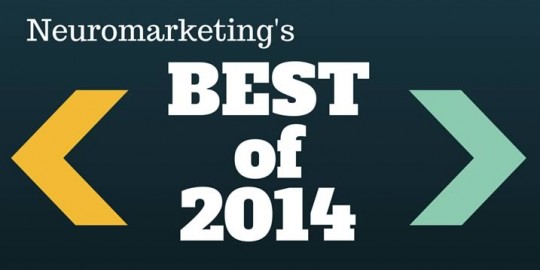Best of Neuromarketing – 2014

As 2014 draws to a close, here are the most-viewed and most-shared Neuromarketing posts. Does this “Readers’ Choice” format always surface the content I think is best? Not always, but making this list is a pretty good indicator that quite a few people found it useful and worth sharing. That’s particularly true with our discerning Neuromarketing readers!
The 3 Types of Buyers, and How to Optimize for Each One
 I absolutely love buyer psychology and neuroeconomics. Want to know why?
I absolutely love buyer psychology and neuroeconomics. Want to know why?
? Because it’s like a secret weapon that produces torrents of conversions (and money).
? Because it’s the only real way to understand why and how buyers make purchases.
? Because it’s the proven route to successful marketing.
? Because it’s guaranteed to squash the competition.
Read More: The 3 Types of Buyers, and How to Optimize for Each One
Two Words That Change How People Think of You
 Almost certainly, there are two words that have been drilled into you as important since the day you started talking.
Almost certainly, there are two words that have been drilled into you as important since the day you started talking.
Now, research shows these words have surprising power over how others perceive you.
The words, as you may have guessed, are …
Read more: Two Words That Change How People Think of You
The Future of Web Design May Be Ugly
 We’ve seen a variety of disastrous web design trends over the years. Remember splash pages? All-Flash sites? Frames? We may be on the cusp of a new trend: unstyled ugliness.
We’ve seen a variety of disastrous web design trends over the years. Remember splash pages? All-Flash sites? Frames? We may be on the cusp of a new trend: unstyled ugliness.
Read more: The Future of Web Design May Be Ugly
Can You Double Your Clicks with the Jeopardy Effect?
 Do you want more clicks on your tweets? Or, on your marketing links in emails or ads? Or, if you are a blogger, journalist, or content writer, could you do with more traffic to your articles? A new study by researchers at the BI Norwegian Business School demonstrates that phrasing headlines in a particular way more than doubled clicks, on average.
Do you want more clicks on your tweets? Or, on your marketing links in emails or ads? Or, if you are a blogger, journalist, or content writer, could you do with more traffic to your articles? A new study by researchers at the BI Norwegian Business School demonstrates that phrasing headlines in a particular way more than doubled clicks, on average.
Read more: Can You Double Your Clicks with the Jeopardy Effect?
The Neuroscience of Conversion Optimization
 If you’re a digital marketer, then you know the feeling.
If you’re a digital marketer, then you know the feeling.
You poured your heart and soul into a recent campaign, and you can’t wait to see the results. A few days later, you check the data and what do you see…an embarrassingly low conversion rate.
Read more: The Neuroscience of Conversion Optimization
Why Your Middle Initial Makes You Smarter
 Years ago, I stopped using my middle initial on business cards, bylines, and other places. I’m not quite sure why I changed… simplicity? Google? New research shows that making that switch might have been a dumb move.
Years ago, I stopped using my middle initial on business cards, bylines, and other places. I’m not quite sure why I changed… simplicity? Google? New research shows that making that switch might have been a dumb move.
Read more: Why Your Middle Initial Makes You Smarter
4 Facts About Decision Making That Will Improve Conversion Rate Optimization
 Everything in conversion optimization comes down to the customer making a decision
Everything in conversion optimization comes down to the customer making a decision
Yes or no. That’s the clutch point in conversion optimization.
Leading up to this decision is the process of decision making. Everyone makes decisions. The outcome of these decisions means a conversion or not.
Read more: 4 Facts About Decision Making That Will Improve Conversion Rate Optimization
How Top Conversion Experts Seduce You Into Giving Up Your Email
 These days, almost every website wants your email address. It might be for a newsletter, for blog updates, or special offers… whatever the reason, these site owners know that a good email list is a critically important business asset.
These days, almost every website wants your email address. It might be for a newsletter, for blog updates, or special offers… whatever the reason, these site owners know that a good email list is a critically important business asset.
But, how do you get visitors to subscribe? In these days of overstuffed inboxes, there’s surprising resistance to giving up one’s email. So, we looked to the top conversion experts in the world to find their secrets for turning casual visitors into subscribers.
Read more: How Top Conversion Experts Seduce You Into Giving Up Your Email
A Simple Hack That Makes You MUCH More Persuasive
 Whether you are writing an article intended to persuade, designing a commercial website, or building your slide deck to pitch your big idea, you can give your credibility a boost with one small change.
Whether you are writing an article intended to persuade, designing a commercial website, or building your slide deck to pitch your big idea, you can give your credibility a boost with one small change.
Read more: A Simple Hack That Makes You MUCH More Persuasive
A Super-Simple Way to Make Your Prices Seem Lower… With One Catch
 Want to make your prices seem lower without actually changing them? I’ve got a research-based technique that will do exactly that, with one small catch: your prices will only look lower to your male customers.
Want to make your prices seem lower without actually changing them? I’ve got a research-based technique that will do exactly that, with one small catch: your prices will only look lower to your male customers.
Read more: A Super-Simple Way to Make Your Prices Seem Lower… With One Catch
The 1-2 Landing Page Punch that Will Boost Conversions
 Many marketers get so caught up in the technique of marketing that they neglect the human element behind it. Ecommerce, despite its digital facade, is an intensely human platform because it’s driven by people buying stuff from other people.
Many marketers get so caught up in the technique of marketing that they neglect the human element behind it. Ecommerce, despite its digital facade, is an intensely human platform because it’s driven by people buying stuff from other people.
This realization — commerce’s status as a platform of exchange between two human beings — leads me to another observation. If we don’t communicate to people in our marketing, then people won’t respond. If we don’t interact with people, then our efforts are completely useless.
Read more: The 1-2 Landing Page Punch that Will Boost Conversions
Why You Are a Complete Idiot If You Don’t Google Yourself
 The other day, I read a story at Fast Company titled Why You Should Google Yourself And Not Feel Guilty About It. I agreed with the reasoning of the author, Lindsay Lavine (@lindsaylavine), but was slightly puzzled by the “guilty” part. The headline was underscored by the opening sentence, “Admit it. You’ve Googled yourself, and probably felt guilty about it afterwards.”
The other day, I read a story at Fast Company titled Why You Should Google Yourself And Not Feel Guilty About It. I agreed with the reasoning of the author, Lindsay Lavine (@lindsaylavine), but was slightly puzzled by the “guilty” part. The headline was underscored by the opening sentence, “Admit it. You’ve Googled yourself, and probably felt guilty about it afterwards.”
Read more: Why You Are a Complete Idiot If You Don’t Google Yourself
It’s Time to Forget the Fold
 If you work with digital ads, you are no doubt familiar with the “fold” – the place where the user’s screen cuts off the content, and scrolling is required to view more. (It’s an anachronistic term from the newspaper days, when stories above the fold in the middle of the page were more prominent than those below.) Many advertising contracts specify “above the fold” placement on web pages, although exactly where that fold occurs depends on a variety of factors like screen resolution, browser window dimensions, etc.
If you work with digital ads, you are no doubt familiar with the “fold” – the place where the user’s screen cuts off the content, and scrolling is required to view more. (It’s an anachronistic term from the newspaper days, when stories above the fold in the middle of the page were more prominent than those below.) Many advertising contracts specify “above the fold” placement on web pages, although exactly where that fold occurs depends on a variety of factors like screen resolution, browser window dimensions, etc.
Read more: It’s Time to Forget the Fold
Can One Word Turn Work into Play?
 Surprising new research shows that introducing one word into the conversation can change how people feel about their work and significantly impact effort and outcomes.
Surprising new research shows that introducing one word into the conversation can change how people feel about their work and significantly impact effort and outcomes.
Most of us are part of teams. We group ourselves in companies, departments, projects, and various other ways. And, even when there’s no formal team, our individual work is very often part of a collective effort. Despite this, most tasks involve primarily solo work by individual members.
Read more: Can One Word Turn Work into Play?
Did you have a Neuromarketing favorite that didn’t make the list? Share it in a comment! And, best wishes for an awesome 2015! I’ll do my best to help you make it successful with new ways to market to your customer’s brain!
